The cave so huge it has its own weather system: Explorers discover a lost world with thick cloud and fogs trapped inside
The cave system was discovered in the Chongquing province of China by a team of cavers and photographers Caver Robbie Shone, from Manchester, said a few of the caves had previously been used by nitrate miners but had not been properly explored The network, which includes ‘cloud Ladder Hall’ measuring around 51,000 metres squared, has water sources and vegetation of the floor
Adventurers have stumbled across a cave so enormous that it has its own weather system, complete with wispy clouds and lingering fog inside vast caverns.
A team of expert cavers and photographers have been exploring the vast cave system in the Chongquing province of China and have taken the first-ever photographs of the natural wonder.
They were amazed to discover the entrance to the hidden Er Wang Dong cave system and were stunned when they managed to climb inside to see a space so large that it can contain a cloud.

The view from a small window in the wall of the vast Niubizi Tian Keng in the Er Wang Dong cave system, where clouds form inside the huge spaces. Three tiny explorers can be seen negotiating the heavily vegetated floor

An intrepid cave explorer ascends a rope hanging from the Niubizi Tian Keng. This photograph is one of the first-ever images taken of one of a cave so large it has its own weather system
Photographer and caver Robbie Shone, from Manchester, was part of a team of 15 explorers on a month-long expedition that discovered the hidden system.
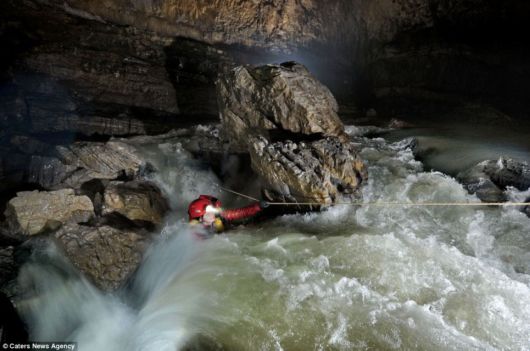
American speleologist Erin Lynch struggles to pull her way across a raging torrent of white water, which is the main river in Quankou Dong. One of the explorers said they had to be aware of high water levels inside the caves, especially when it rained heavily on the surface ‘It is always very special, knowing that you are the first to step foot into a cave or somewhere where nobody had previously seen, not knowing what you might find and discover.
‘Where else on Earth can still hold secrets and mysteries of discovery? That’s what I love so much about exploring.
Mr Shones was particularly excited about the cave network’s interior weather system.

The spectacular beddings in the roof of Quankou. Photographer and caver Robbie Shone, from Manchester, was part of a team of 15 explorers on a month-long expedition who stumbled across the natural wonder
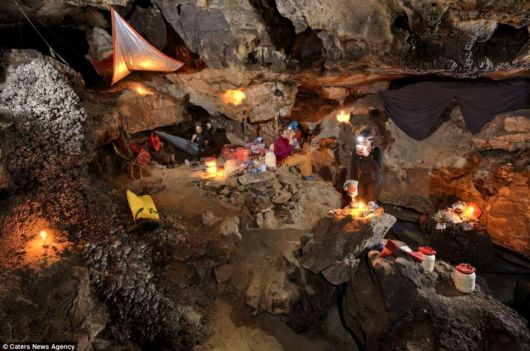
The underground camp in Sang Wang Dong is cosy and warm, according to the cavers. Hot food and drink recharge weary and tired explorers who sleep in either suspended hammocks or on roll mats on the floor, before venturing out into the vast surroundings

American speleologist Erin Lynch peers down over her shoulder into a giant void of cloud.The floor is over 240m below and although it cant be seen due to the thick cloud that lingers around her, the echo that reverberates several seconds later reminds her of the volume of empty space and her lofty location ‘I had never seen anything quite like the inside cloud ladder before,’ he said.
‘Thick cloud and fogs hangs in the upper half of the cave, where it gets trapped and unable to escape through the small passage in the roof, 250m above the ground.
‘It reminded me of being in an abandoned slate quarrying North Wales in bad weather.
The cave system discovered is not the only one with clouds inside, as humidity rises inside the caverns into colder air to form clouds inside the giant, enclosed spaces.

Large stalagmites at the foot of a giant ascending ramp to another level of development in San Wang Dong create a spectacle mid-way through a section of cave called Crusty Duvets
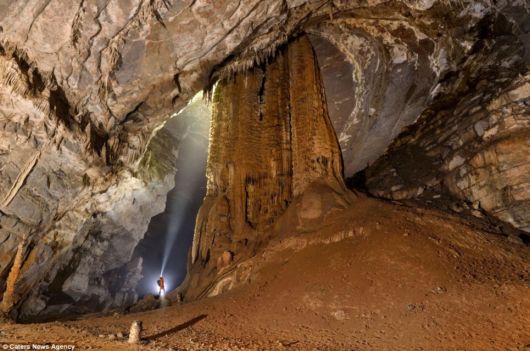
A giant calcite stalactite boss, dwarfs team member Matt Ryan as he looks up at the giant geological feature The network, includes ‘Cloud Ladder Hall’ which itself measures around 51,000 metres squared, while there are rivers and vegetation on the floor of some of its huge caverns.
‘Most caves are either accessed by large walking entrance, some require a long deep swim, other may be very vertical in nature where you need ropes to abseil down the walls deep into the caves.
‘We had to be aware of high water levels inside the caves, especially when it rained heavily on the surface.
‘The drainage catchment to these caves is massive and soon the caves can be extremely dangerous and impassable,’ he added.
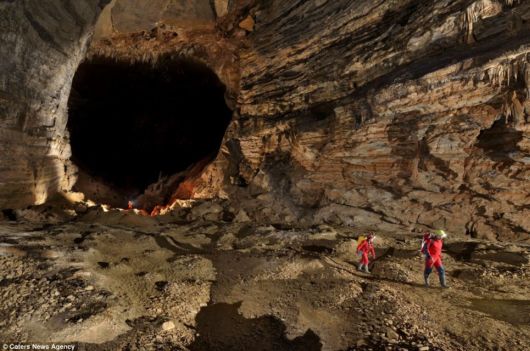
Duncan Collis and Erin Lynch walk through a section of cave in San Wang Dong called The Sea of Tranquility. Here remains of old Nitrate mining cover the floor in forms of harths – pits and unwanted spoil. One team member said it reminded him of being in an abandoned slate quarrying North Wales in bad weather
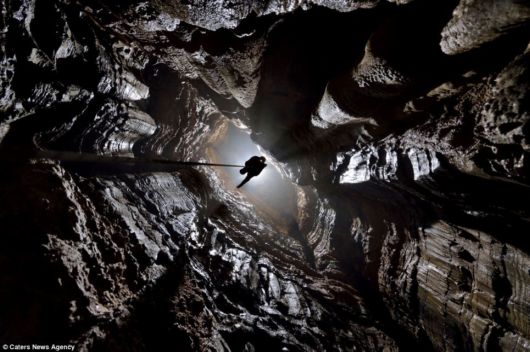
An explorer scales the rope up a vertical section of cave known as a pit in Xinu Attic
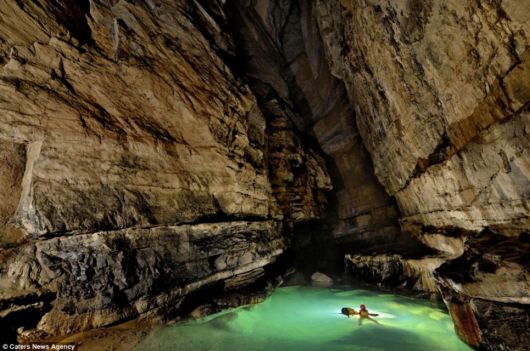
Crystal clear pools and slow moving streams make it easier to explore Quankou Dongs main river passage in the huge network of caves that have not welcomed visitors in years

